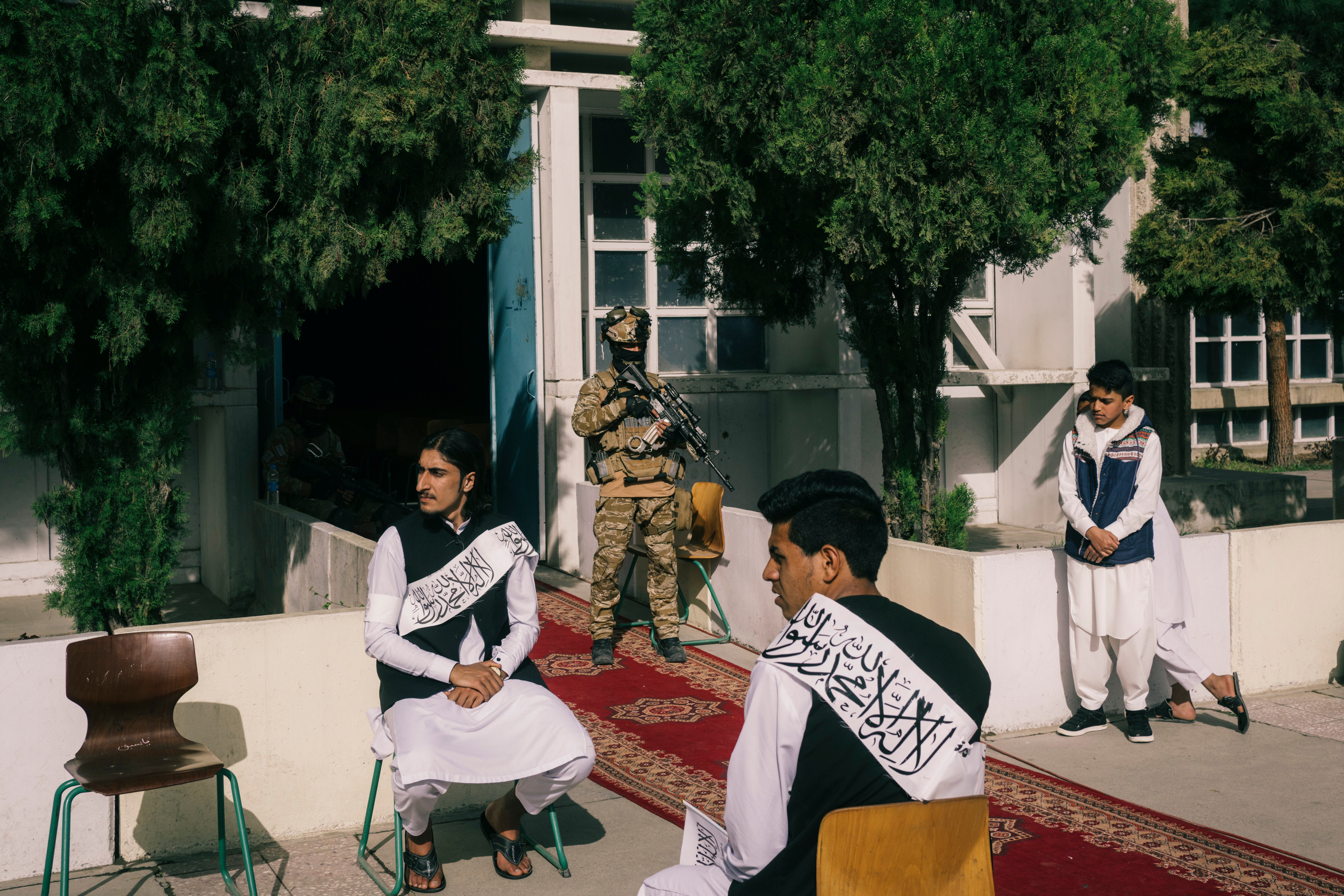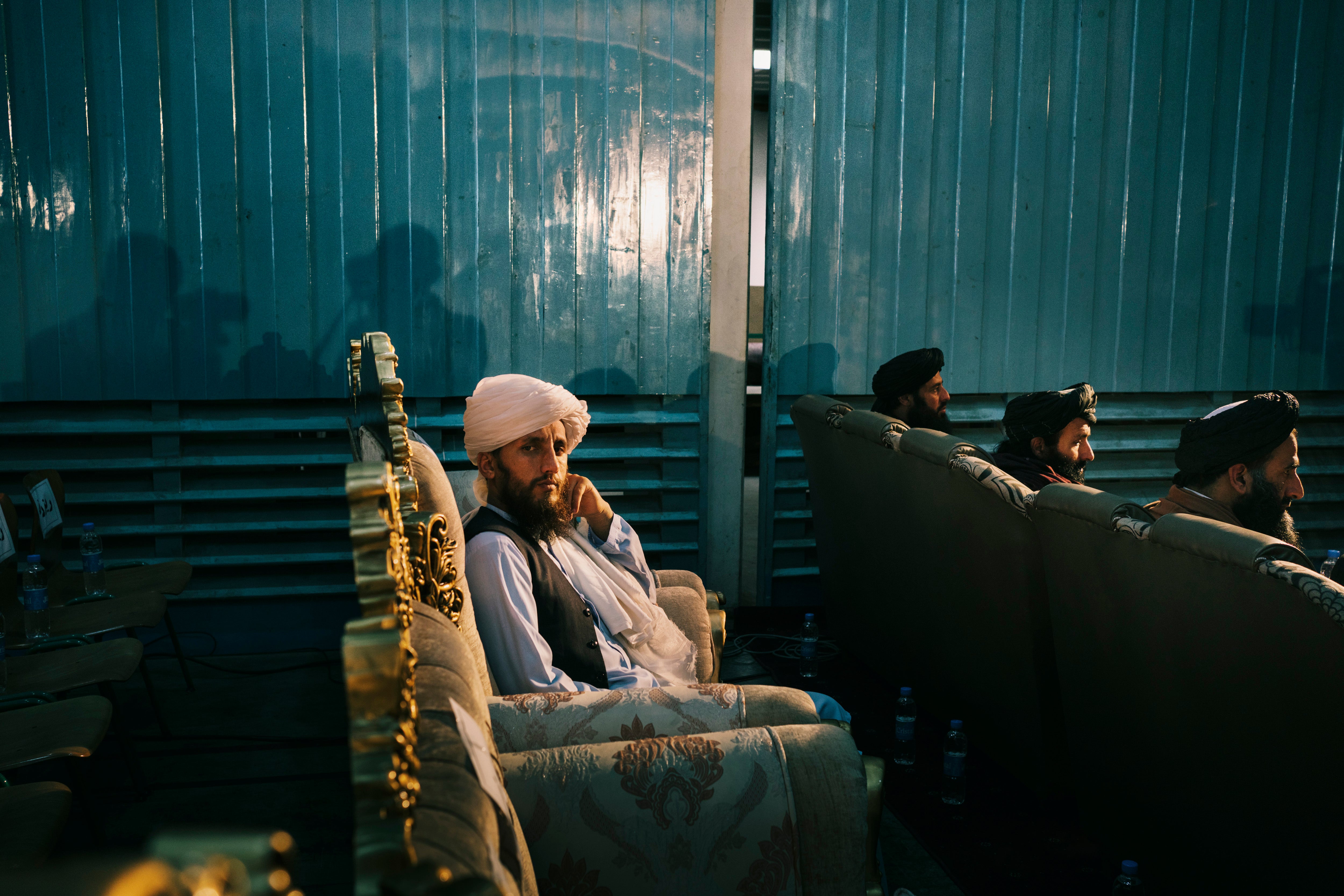
Fatima and Khudija arrived at their school in central Kabul early on Wednesday, eager to see their exam results from the previous year. But after just a few minutes in their old classrooms, they were reluctantly ordered off the premises by the deputy principal.
Despite pledging to allow girls of all ages to attend when schools reopened this week, the Taliban’s education ministry issued a last-minute reversal that banned girls beyond seventh grade (that is, those aged 13 and above, starting secondary school) from returning.
“At that moment, all we felt was sadness,” says Fatima, 15, who, like Khudija, 19, agreed to speak on the condition that only her first name be used, for fear of reprisals. “We suffered for a long time to get an education and faced many difficulties. So when we finally returned, and it was taken away, it was overwhelming. All we could do was cry.”
Girls’ education and women’s rights have been central to discussions with the international community in which the Taliban has pressed for international recognition, the easing of financial sanctions, and an increase in aid money. But female students and teachers fear that Wednesday’s order is a signal that the group is unwilling to provide access to education for all Afghan girls.
“If [the Taliban] don’t reconsider this decision, I fear they will take more steps against women,” Fatima says.
Across town, at an all-boys school, Taliban officials gathered on Wednesday at a ceremony marking the reopening of schools. Uniformed male students holding Taliban flags stood to attention and chanted “God is great” as the event began and concluded.
“We assure our Afghan sisters that they would be allowed to attend school once our leadership makes a decision,” Aziz Ahmad Rayan, a spokesperson for the education ministry, said at the ceremony. He said the Taliban’s acting cabinet needed to consider “some cultural and religious obligations” first. A statement from the education ministry said it hadn’t designed a school uniform for female students that was “in accordance with sharia [Islamic] law, Afghan culture and customs”.
We are also humans. Why should we not be allowed to go to school? Our hearts are crying tears of blood
Mawlawi Noorul Haq, a senior Taliban official who also spoke at the ceremony, pushed back against claims that the Taliban is “anti-education”.
“In reality, the basis of the Taliban is knowledge. We fought against ignorance,” he said.
The Taliban closed all schools after taking control of the country more than seven months ago. The group allowed some to reopen, but kept many shuttered – particularly girls’ schools – saying it needed time to develop national education policies. Rayan said last week that all Afghan children – boys and girls – would be allowed to return to class when schools reopened on Wednesday.
Muhammad Ibrahim, a principal at Ayesha Durkhanai girls’ school in Kabul, was not informed of the reversal until Tuesday night, when he received a WhatsApp message in a group chat for his education district.
“How do you think I felt?” he asks. He and his colleagues had prepared curriculums and schedules, assuming that all their students would return. It was “heartbreaking” to tell the older girls they were not allowed through the schoolyard gates and had to go home. “This is something unprecedented,” says Ibrahim.
Social media was flooded with images and videos, some broadcast by local media, of young women and girls crying outside the schools they were barred from entering.

“We are also humans. Why should we not be allowed to go to school? Our hearts are crying tears of blood,” one woman told an Afghan television network, not identifying herself by name on camera. “Why? What did we do? What are we guilty of?” she asked.
The Taliban banned girls from education beyond primary school in most of the Afghan territory it controlled before taking over the entire country last year. In many Taliban-controlled districts, there was not a single functioning school for girls for years.
Since taking control of Afghanistan, the group has issued vague statements when asked about the future of education for girls and women, especially beyond primary school.
Residents in provinces outside Kabul describe similar scenes on Wednesday morning, when they sent their daughters back to school only to have their older girls sent home.
Noorullah Stanakzai, 45, of Logar province, had been informed that all his daughters could return to school on Wednesday, but that those in seventh grade and beyond would be required to wear a head-to-toe covering, gloves and black shoes. Despite wearing the new uniform, he says, the girls were sent home. The principal said the school did not have enough female teachers, Stanakzai says.
Even before Wednesday’s ruling, Stanakzai says, his daughters “were not as eager to go to school as they used to be. They told me, ‘My future is no longer clear,’ and they worry that soon it will not be possible for women to go to university in Afghanistan.”

“They have lost interest in school because they are not optimistic about the future,” he says.
Wednesday’s ruling is likely to be seen as a setback by western governments that have been pushing the Taliban to respect the rights of women and to allow access to education for all Afghans regardless of their sex.
Rayan, the education ministry spokesperson, said that ultimately the decision on access to education for women and girls would have to be made by top leadership.
“Reopening of girls’ schools above the sixth grade is beyond the mandate of the education ministry,” he said. But he added that the ministry would “work closely with Taliban leadership to secure permission for the reopening of all girls’ schools”.
In a sixth-grade classroom at Ayesha Durkhanai girls’ school in Kabul on Wednesday, nearly all the students raised their hands when asked if they had an older sister who was barred from attending classes.
Twelve-year-old Shahnaz Nasrati said her sister was sad and anxious after she was turned away that morning.
“We want the officials to allow the older girls to also attend school, because otherwise none of us will be able to go higher,” she said. If she is barred from school next year, she said, “we will have to start demonstrating!”.
The rest of the girls in the classroom laughed, but when they were asked who would participate, everyone’s hand shot up.
The Washington Post’s Aziz Tassal in Houston, and Haq Nawaz Khan in Peshawar, Pakistan, contributed to this report
© The Washington Post







